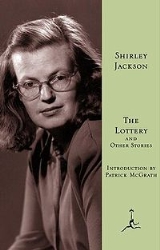
author. A popular writer in her time, her work has received increasing attention from literary critics in recent years. She has influenced such writers as Neil Gaiman
, Stephen King
, Nigel Kneale
and Richard Matheson
.
She is best known for the short story
"The Lottery
" (1948), which suggests a secret, sinister underside to bucolic small-town America. In her critical biography of Jackson, Lenemaja Friedman notes that when "The Lottery" was published in the June 26, 1948, issue of The New Yorker
, it received a response that "no New Yorker story had ever received." Hundreds of letters poured in that were characterized by, as Jackson put it, "bewilderment, speculation and old-fashioned abuse."
In the July 22, 1948, issue of the San Francisco Chronicle
Jackson offered the following in response to persistent queries from her readers about her intentions:
Explaining just what I had hoped the story to say is very difficult.
Cocoa? Cocoa! Damn miserable puny stuff, fit for kittens and unwashed boys. Did Shakespeare drink cocoa?![]()
Life Among the Savages is a disrespectful memoir of my children.![]()
The children assembled first, of course. School was recently over for the summer, and the feeling of liberty sat uneasily on most of them; they tended to gather together quietly for a while before they broke into boisterous play.
![]()
Old Man Warner snorted. "Pack of crazy fools, he said. "Listening to the young folks, nothing's good enough for them. Next thing you know, they'll be wanting to go back to living in caves, nobody work any more, live hat way for a while. Used to be a saying about 'Lottery in June, corn be heavy soon.' First thing you know, we'd all be eating stewed chickweed and acorns. There's always been a lottery," he added petulantly.
![]()
"Some places have already quit lotteries." Mrs. Adams said."Nothing but trouble in that," Old Man Warner said stoutly. "Pack of young fools."
![]()
Bill Hutchinson went over to his wife and forced the slip of paper out of her hand. It had a black spot on it, the black spot Mr. Summers had made the night before with the heavy pencil in the coal company office. Bill Hutchinson held it up, and there was a stir in the crowd.
![]()
Although the villagers had forgotten the ritual and lost the original black box, they still remembered to use stones.
![]()
"It isn't fair, it isn't right," Mrs. Hutchinson screamed, and then they were upon her.
![]()

